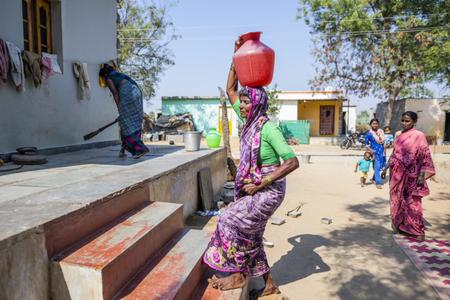Come rain or sunshine, ill health or back-breaking tiredness, 60-year-old Mahadev Amma of Madamandoddi village in Karnataka’s Raichur district had to walk a long way to collect water every day. There were two water tanks in her village, but one was broken and not in use while the other was in poor condition. “There was no platform around the water tank, hence water and slush would accumulate around it making it dirty,” Mahadev Amma said. But she had no choice. “Each day I would have to get up at 5 a.m. to collect pots of water from the tank. It was tiring, to collect water and then go to work in the fields.”
This has now changed. Safe drinking water, in hygienic surroundings, has become easily accessible to Mahadev Amma and the rest of the community—all thanks to the collective action by the Self Help Group women of the village who, inspired by awareness campaigns on WASH (water, sanitation, and hygiene), decided to take matters in their hands.
Mahadev Amma has a big family of 10 members. This means that the water requirement in her house is also high. “We need water for everything—cooking, cleaning, drinking. Which means that earlier, instead of one round, I’d have to make several rounds of water collection to get at least 20 pots,” she said. Sometimes the entire family would pitch in to get water, at other times she would get one or two extra pair of hands for help. “I have gone to collect water in fever and despite being tired. There was no other choice.”
Then, about two years back, a team of volunteers trained by WaterAid India came to test the quality of water in the bore well which supplies water to the water tank in the village. It was found to be contaminated. “We had no idea that the water we were collecting to use so painstakingly was unsafe to drink,” she said.
Meanwhile, the Self Help Group of the village, of which Mahadev Amma is a part, underwent awareness meetings by WaterAid India on the significance of water, sanitation, and hygiene in their lives. They were told how unsafe water could cause illnesses and impact children’s healthy growth, affect adults, and increase health expenditures. Inspired, the Self Help Group decided to invest in the restoration of the mini water tanks in their village.
“Each woman of the SHG contributed INR 3000 for the restoration work. Even I gave some money for this work,” she said. Five mini water tanks were restored in the village and with a new bore well installed for water supply, access to clean water has become a reality for everyone. “Some volunteers of the organisation (WaterAid India) first cleaned the area around the tank and painted it. They then constructed a platform so that water does not accumulate around it,” she said and added that the Self Help Group women also take responsibility for keeping the area around the tanks clean.
A waterman has also been appointed and trained to check the quality of water, particularly after monsoons. If there is any water-related issue, he reports to the Panchayat. “Life has become much better for me and my family. We are getting clean water and it is close by so I no longer have to walk far and be exhausted by the water collection work. I save time and get an hour of rest every day!” Mahadev Amma added.







